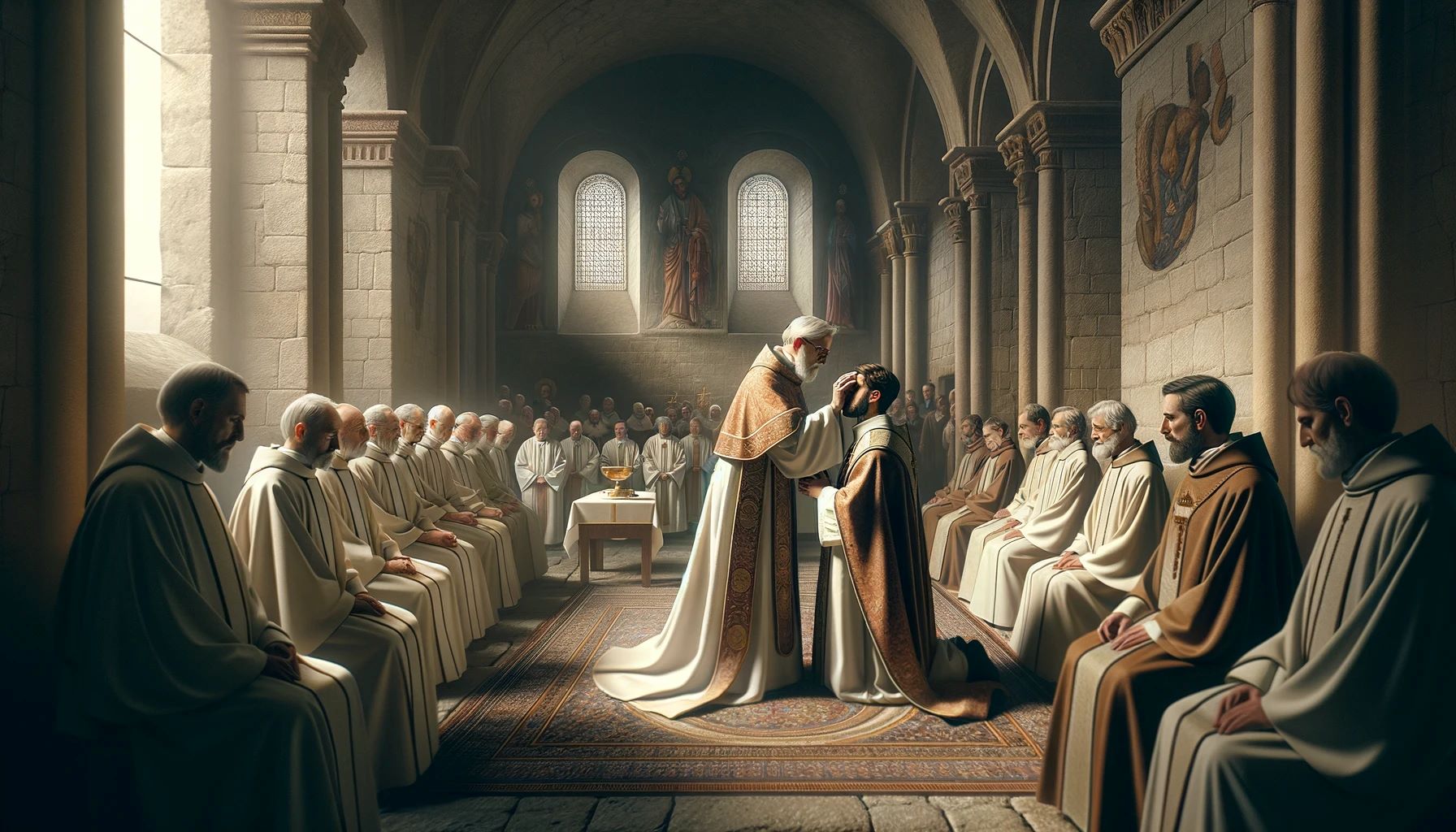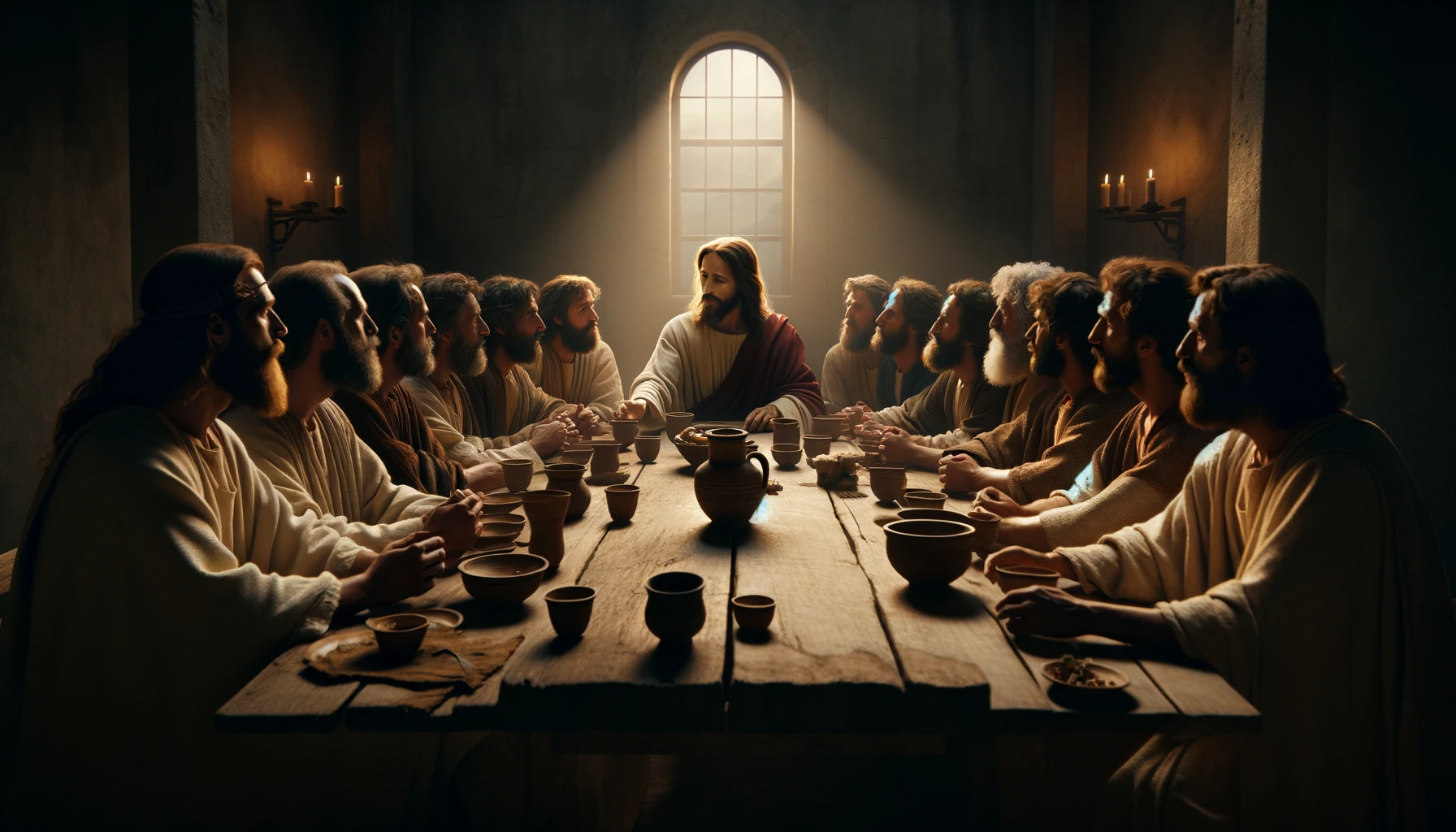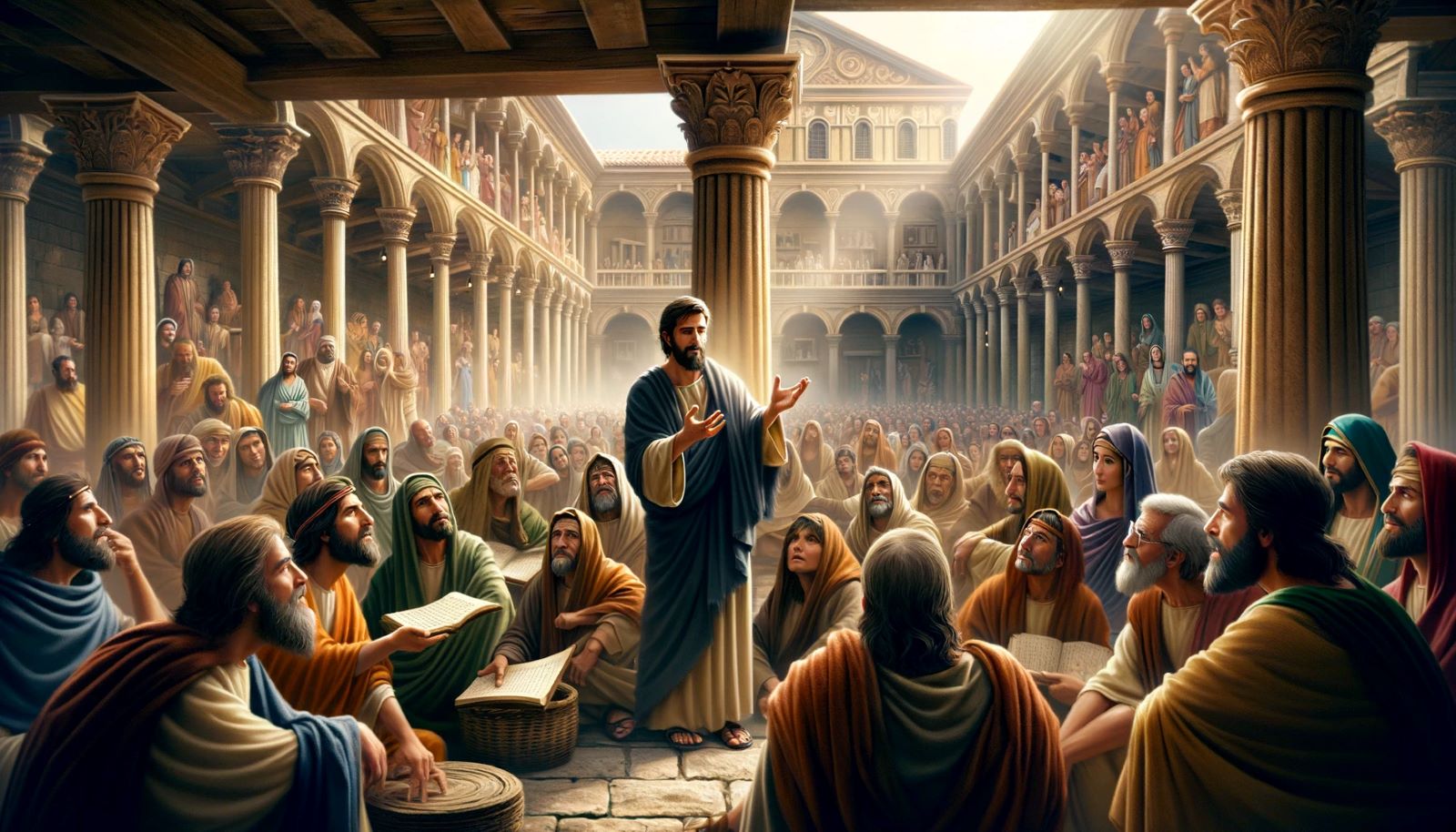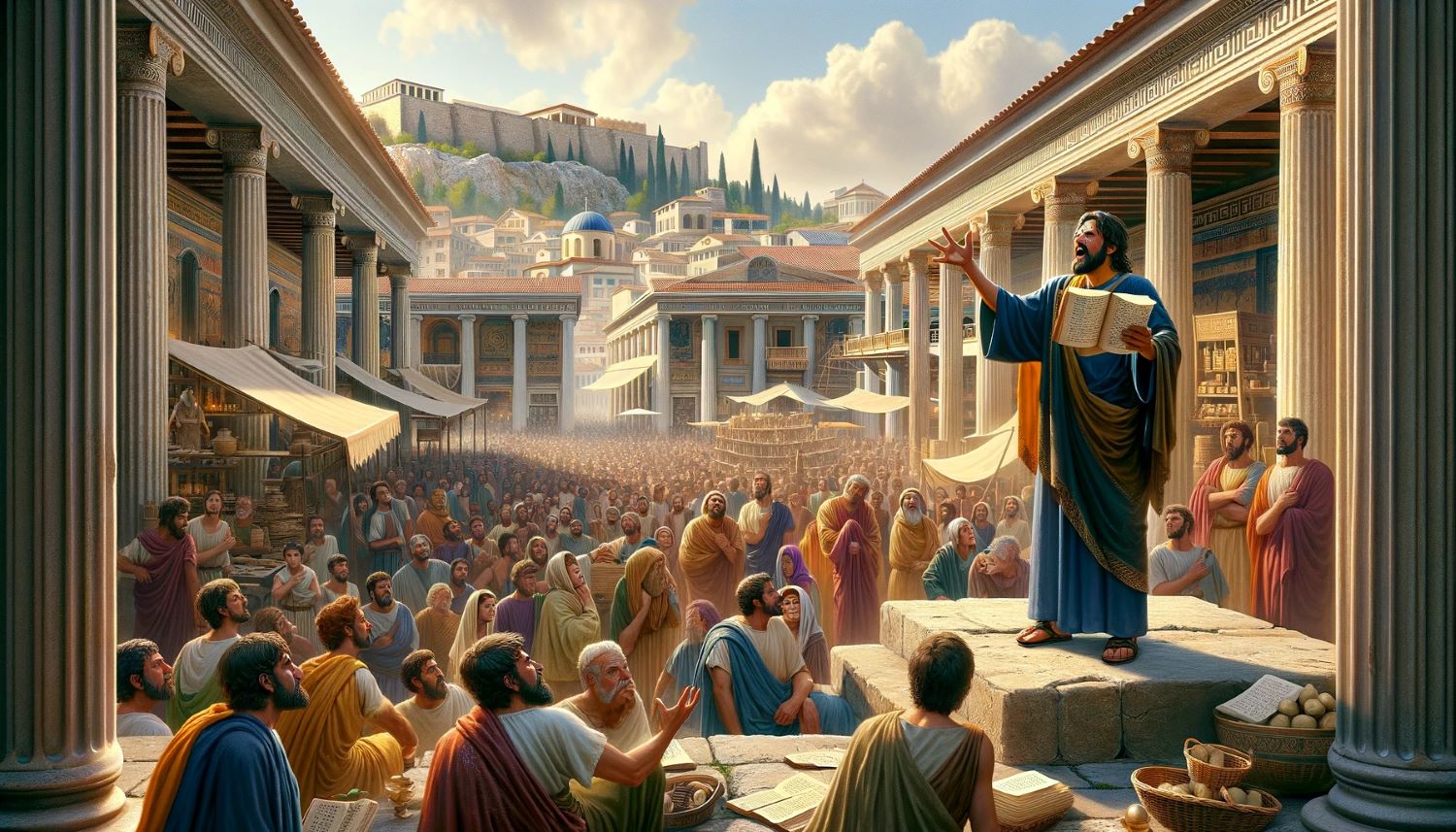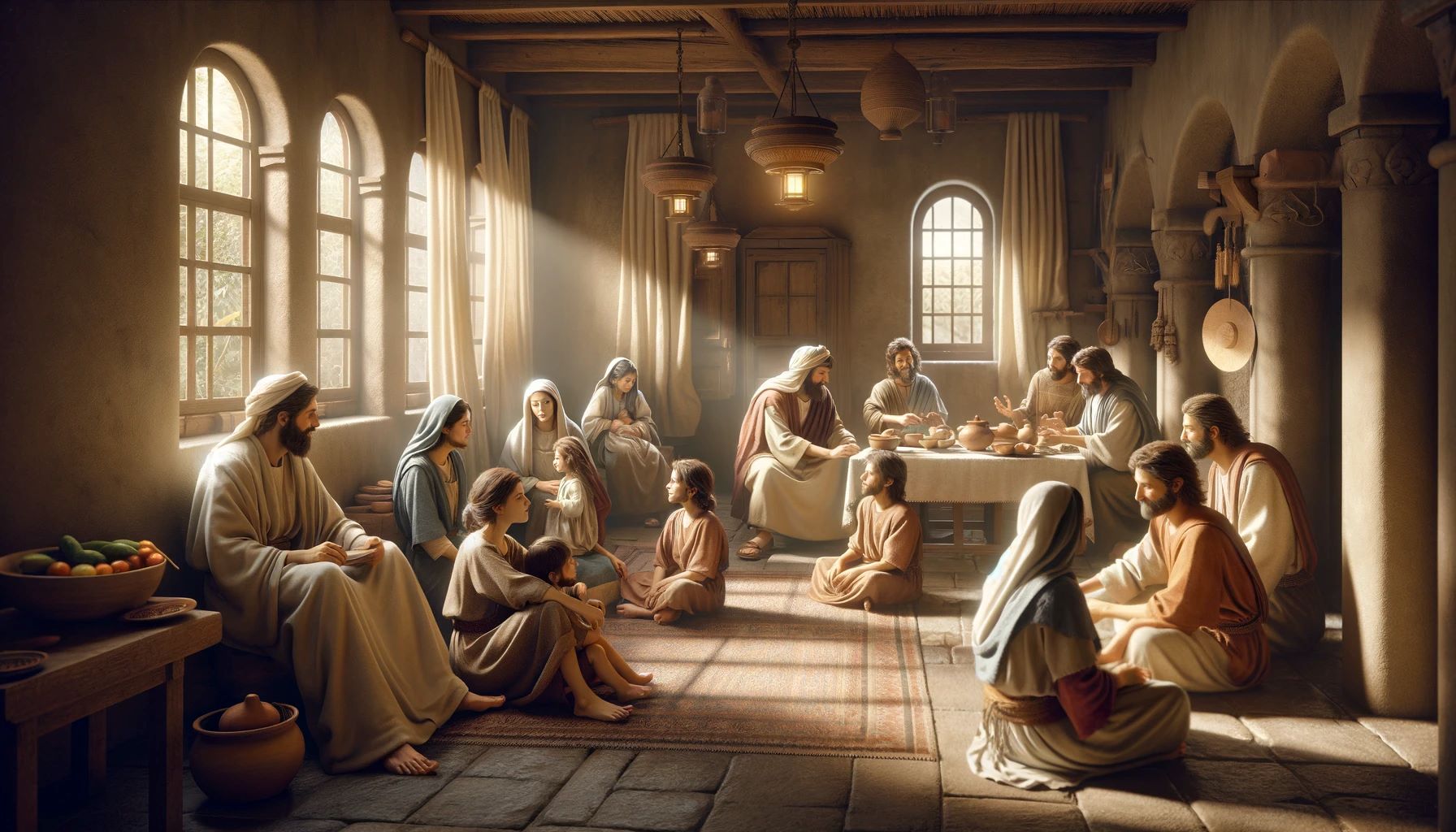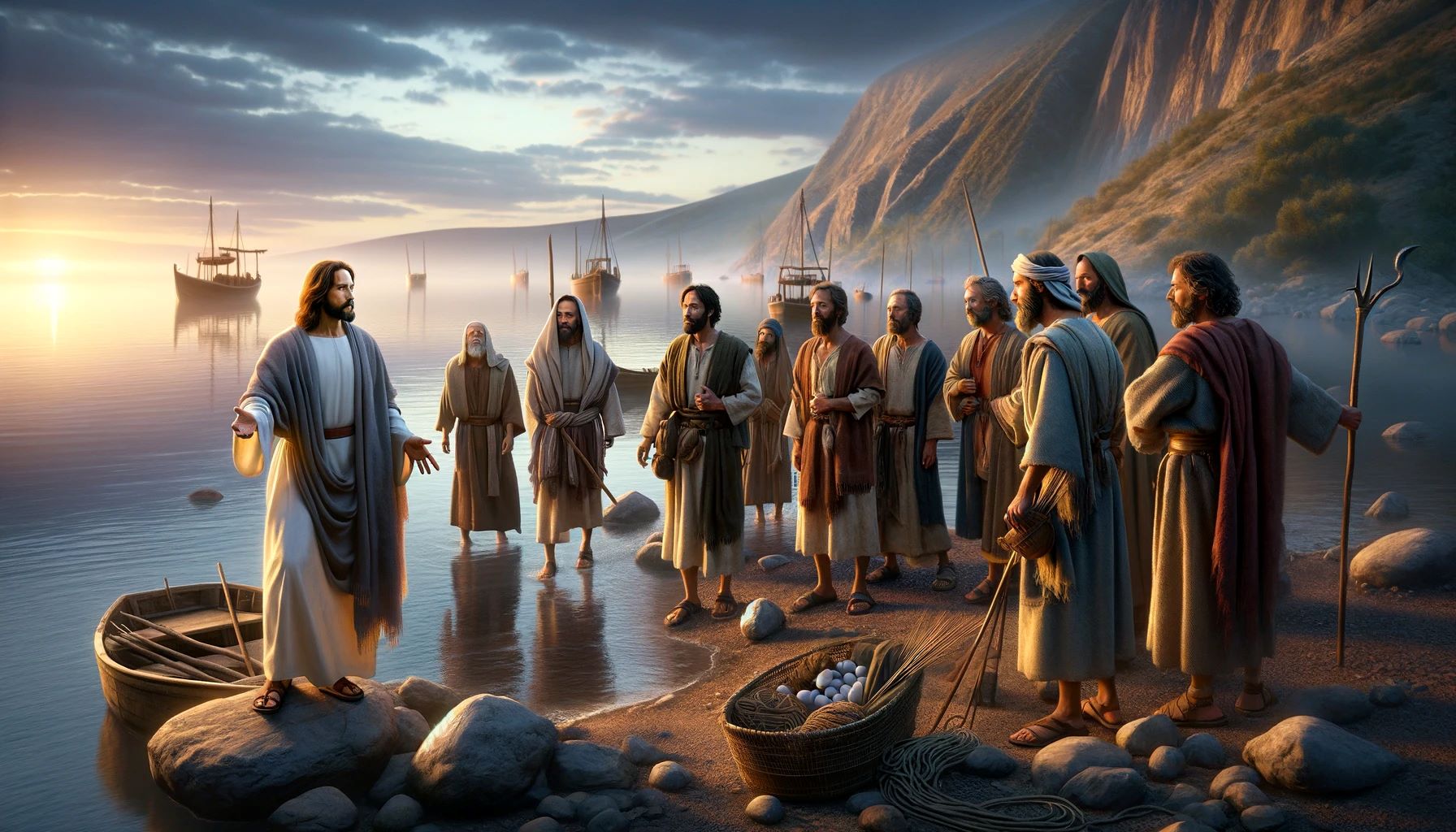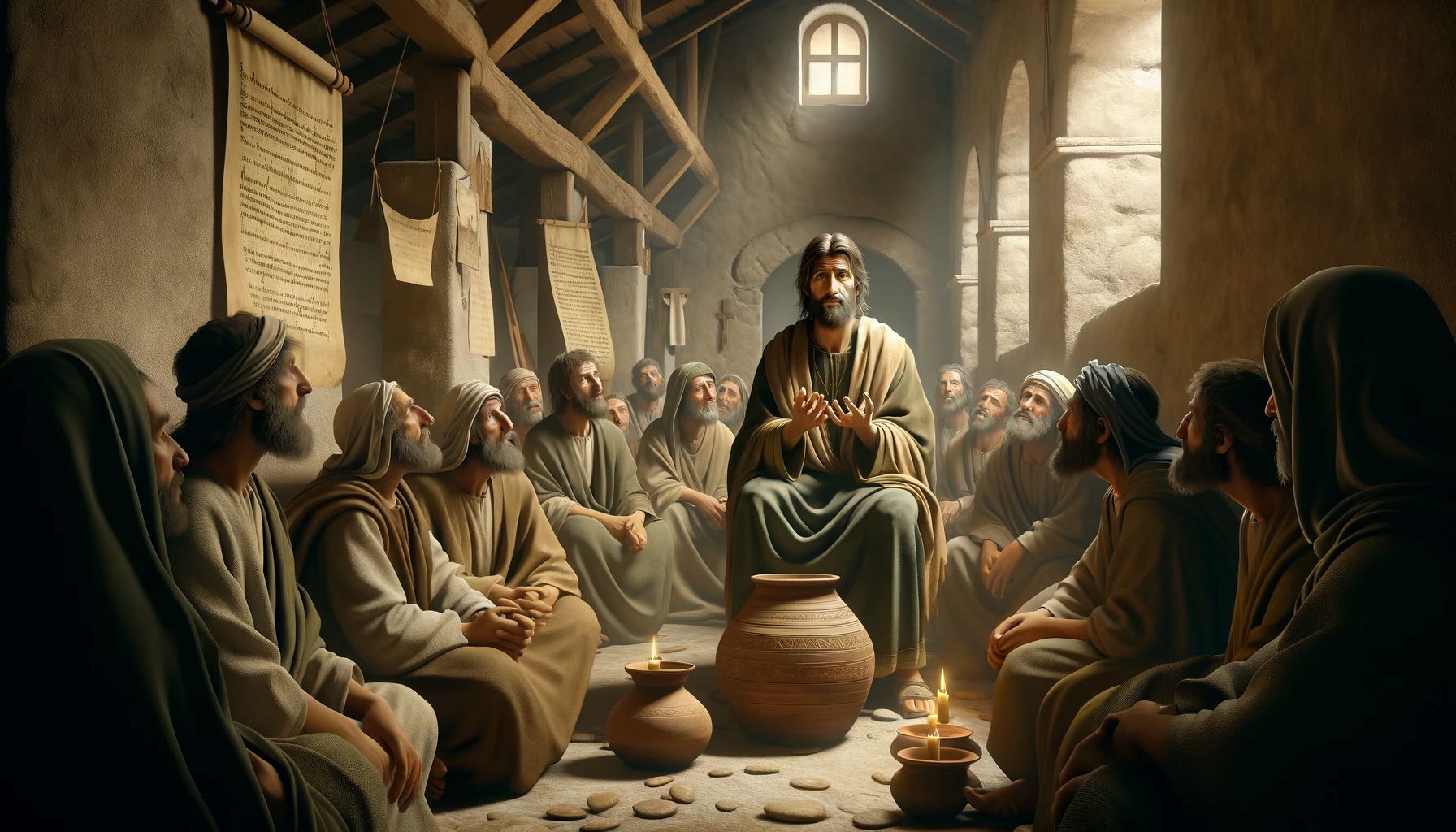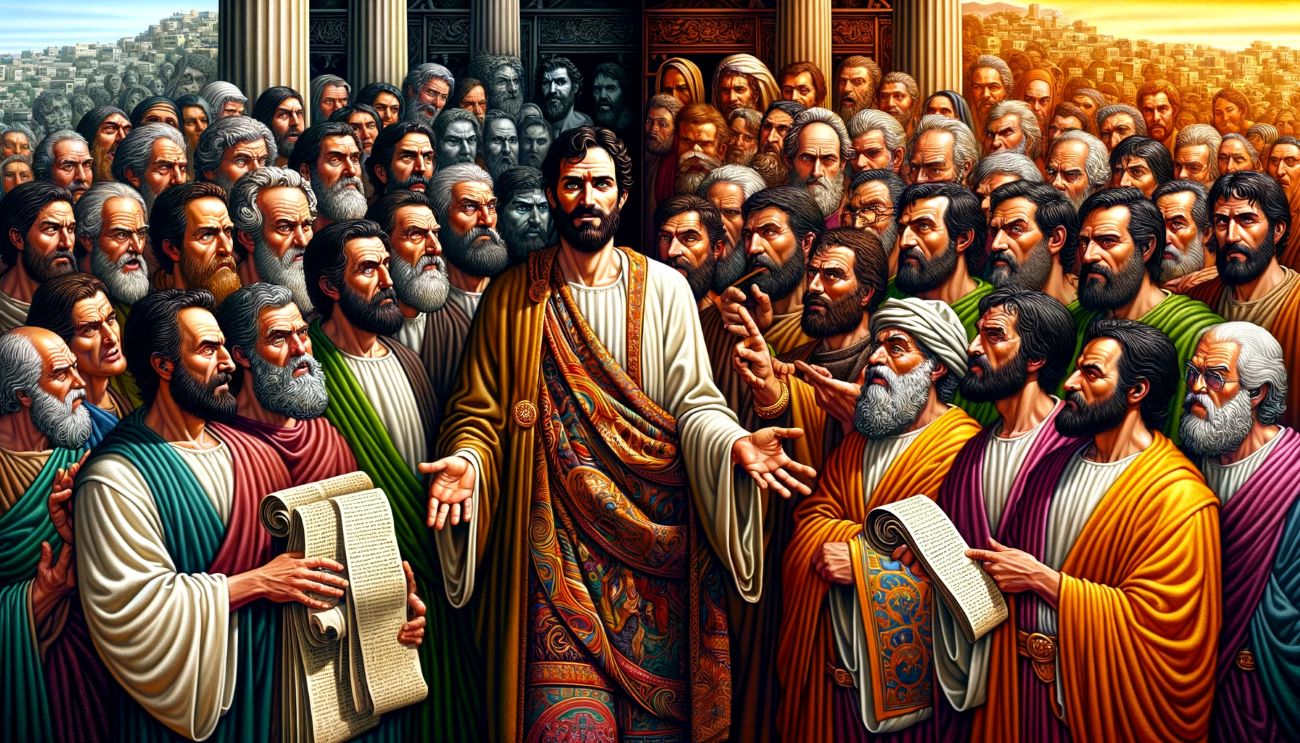Home>Bible Facts>Which Of The Apostles Were Married
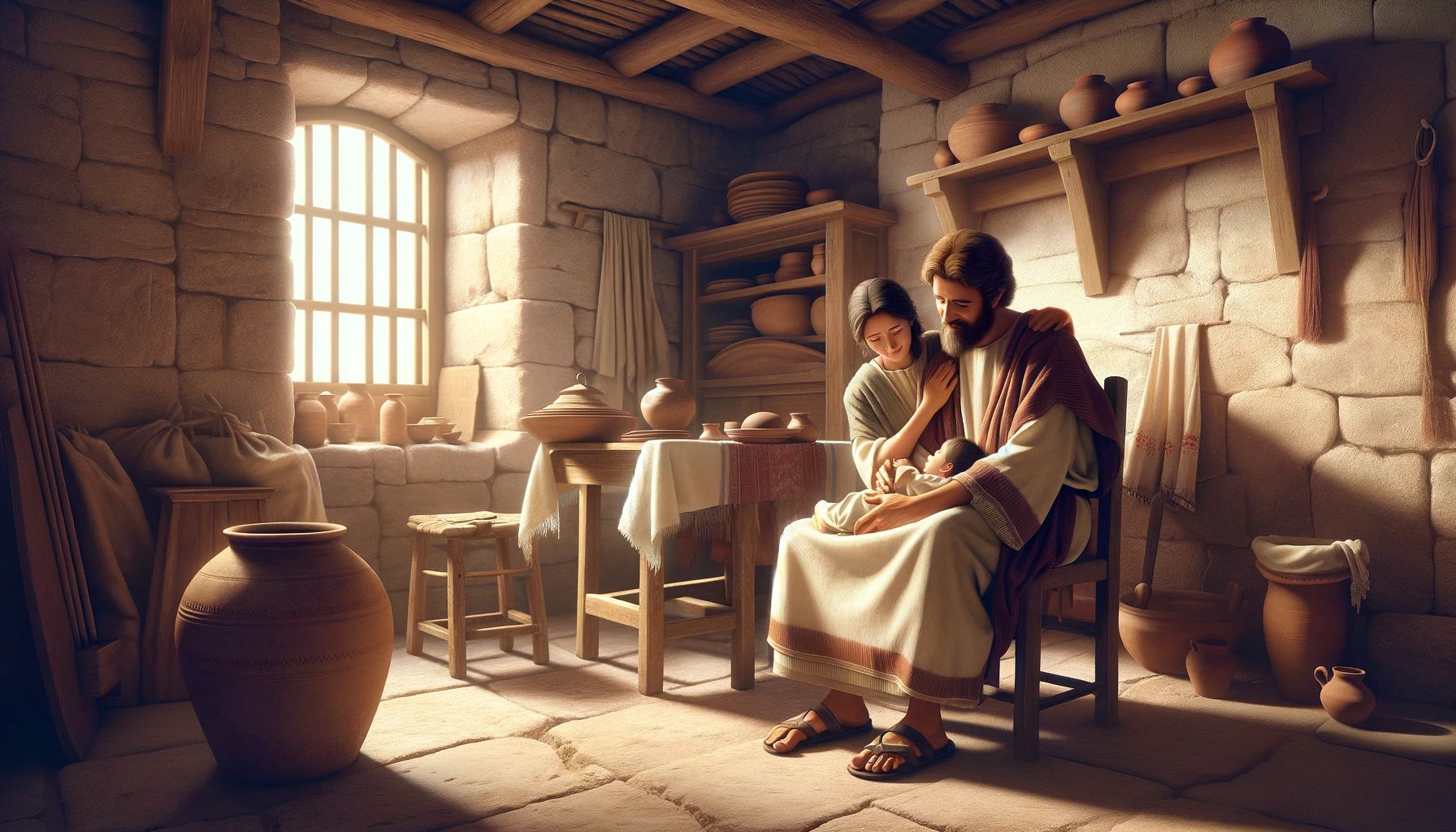

Bible Facts
Which Of The Apostles Were Married
Published: February 22, 2024
Ericka Andersen, an editor at Christian.net, expertly merges digital strategy with content creation, focusing on faith and societal issues. Her communication skills enhance the platform's engaging narratives, fostering meaningful dialogue on belief's impact on society.
Discover surprising Bible facts about the marital status of the apostles. Uncover the truth about which apostles were married and delve into biblical history.
(Many of the links in this article redirect to a specific reviewed product. Your purchase of these products through affiliate links helps to generate commission for Christian.net, at no extra cost. Learn more)
Table of Contents
Introduction
The lives of the apostles hold a profound fascination for many, as they were chosen by Jesus Christ himself to spread his teachings and establish the early Christian church. One aspect of their lives that often piques curiosity is their marital status. Were any of the apostles married? This question has sparked much discussion and speculation throughout history.
In this article, we will delve into the lives of the twelve apostles, exploring historical accounts and biblical references to shed light on their marital status. By examining the lives of these influential figures, we can gain a deeper understanding of their personal lives and the unique challenges they faced as they embarked on their mission to spread the teachings of Jesus Christ.
Join us on this fascinating journey as we uncover the marital status of the apostles and gain insights into their personal lives, shedding light on a lesser-known aspect of their remarkable stories.
Read more: Which Apostles Were The Sons Of Thunder
The Apostle Peter
Peter, originally known as Simon, was a prominent figure among the apostles and held a special place in Jesus' inner circle. He was a fisherman by trade when Jesus called him to become a "fisher of men." Peter's journey with Jesus was marked by moments of great faith and, at times, profound doubt. His impulsive nature often led him to speak and act before fully understanding the implications of his words and actions.
In exploring Peter's marital status, historical and biblical accounts provide intriguing insights. The New Testament mentions Peter's mother-in-law, indicating that he was married. In the Gospel of Matthew, there is a passage that describes Jesus healing Peter's mother-in-law of a fever. This reference indirectly confirms Peter's marital status, as having a mother-in-law implies that he was married.
While the Bible does not provide extensive details about Peter's wife or his married life, the mention of his mother-in-law offers a glimpse into this aspect of his personal life. It is worth noting that Peter's commitment to following Jesus led him to leave behind his occupation and, by extension, his family to embark on his journey as an apostle.
Peter's unwavering dedication to Jesus and his pivotal role in the early Christian church are well-documented. His leadership and influence extended beyond the original twelve apostles, making him a central figure in the spread of Christianity. Despite his human flaws and moments of weakness, Peter's faith and resilience have inspired countless believers throughout history.
As we reflect on Peter's life and contributions, his marital status serves as a reminder of the multifaceted nature of the apostles' experiences. It humanizes these revered figures, offering a glimpse into their personal lives and the sacrifices they made in their commitment to spreading the teachings of Jesus Christ.
In the subsequent sections, we will continue our exploration of the marital status of the remaining apostles, uncovering further insights into their personal lives and the unique dynamics that shaped their journeys as early Christian leaders.
The Apostle Andrew
Andrew, the brother of Simon Peter, is often recognized as the first disciple called by Jesus. A fisherman by trade, Andrew's encounter with Jesus marked the beginning of a transformative journey that would shape the course of his life and legacy. As we explore Andrew's life and ministry, we are drawn to the question of his marital status, seeking to uncover insights into this lesser-known aspect of his personal life.
In examining historical and biblical accounts, the question of whether Andrew was married remains a topic of speculation. The New Testament provides limited information about Andrew's marital status, and no explicit references to his wife or family are found in the Gospels. This absence of specific details has led to varied interpretations and discussions regarding Andrew's marital status.
While the Bible does not offer direct evidence of Andrew's marital status, it is important to consider the cultural context of the time. In the Jewish society of the first century, marriage and family life held significant importance, and it was customary for men of Andrew's age to be married. Given Andrew's close relationship with his brother Peter and their shared occupation as fishermen, it is plausible to consider that Andrew may have been married, aligning with the societal norms of the time.
Andrew's pivotal role in the early Christian church and his unwavering commitment to spreading the teachings of Jesus Christ are well-documented. His humility and dedication to sharing the message of salvation have inspired believers for centuries. While the question of his marital status may remain unanswered, it does not diminish the profound impact of his ministry and the enduring legacy he left behind.
As we reflect on the life of the Apostle Andrew, we are reminded of the complexities and nuances that shape the stories of the apostles. Their personal lives, including marital status, offer glimpses into the human experiences of these revered figures, adding depth to our understanding of their journeys as early Christian leaders.
In the subsequent sections, we will continue our exploration of the marital status of the remaining apostles, uncovering further insights into their personal lives and the unique dynamics that shaped their roles in the early Christian church.
The Apostle James
James, often referred to as James the Greater to distinguish him from the other apostle named James, holds a significant place among the twelve apostles chosen by Jesus. Alongside his brother John, James was a fisherman by trade when Jesus called them to become "fishers of men." His journey with Jesus was marked by profound moments of transformation and spiritual growth, as he witnessed miracles and received teachings directly from the Son of God.
In exploring the marital status of the Apostle James, historical and biblical accounts offer intriguing insights. The New Testament does not explicitly mention James' marital status, leading to speculation and varied interpretations regarding this aspect of his personal life. The absence of specific references to a wife or family in the Gospels has contributed to the mystery surrounding James' marital status.
While the question of whether James was married remains unanswered in biblical accounts, it is important to consider the cultural and societal norms of the time. In the first-century Jewish society, marriage and family life held significant importance, and it was customary for men of James' age to be married. Given his close relationship with his brother John and their shared occupation as fishermen, it is plausible to consider that James may have been married, aligning with the customs and expectations of his cultural milieu.
James' role as one of the inner circle of disciples, alongside Peter and John, reflects his close bond with Jesus and his involvement in pivotal moments of Jesus' ministry, such as the Transfiguration. His unwavering commitment to following Jesus and spreading his teachings exemplifies his dedication to the early Christian faith.
As we reflect on the life and legacy of the Apostle James, his potential marital status adds a layer of complexity to our understanding of his personal life. While the question of his marital status may remain a point of curiosity, it does not diminish the impact of his contributions to the early Christian church and the enduring legacy he left behind.
In the subsequent sections, we will continue our exploration of the marital status of the remaining apostles, uncovering further insights into their personal lives and the unique dynamics that shaped their roles in the early Christian church.
The Apostle John
John, often referred to as the beloved disciple, holds a unique and revered position among the twelve apostles chosen by Jesus. His close relationship with Jesus and his significant contributions to the early Christian church have solidified his legacy as a central figure in the spread of Christianity. As we delve into the life and ministry of the Apostle John, we are drawn to the question of his marital status, seeking to uncover insights into this lesser-known aspect of his personal life.
In exploring historical and biblical accounts, the question of whether John was married remains a topic of speculation. The New Testament provides limited information about John's marital status, and no explicit references to his wife or family are found in the Gospels. This absence of specific details has led to varied interpretations and discussions regarding John's marital status.
While the Bible does not offer direct evidence of John's marital status, it is important to consider the cultural context of the time. In the Jewish society of the first century, marriage and family life held significant importance, and it was customary for men of John's age to be married. Given John's close relationship with Jesus and his prominent role among the apostles, it is plausible to consider that John may have been married, aligning with the societal norms of the time.
John's intimate connection with Jesus is evident throughout the Gospels, as he is often described as the disciple whom Jesus loved. His presence at pivotal moments, such as the Last Supper and the crucifixion, underscores his significance in the life of Jesus and the early Christian church. His authorship of the Gospel of John, three epistles, and the Book of Revelation further demonstrates his profound influence on Christian theology and doctrine.
As we reflect on the life and legacy of the Apostle John, the question of his marital status adds a layer of complexity to our understanding of his personal life. While the question of his marital status may remain unanswered, it does not diminish the impact of his contributions to the early Christian church and the enduring legacy he left behind.
In the subsequent sections, we will continue our exploration of the marital status of the remaining apostles, uncovering further insights into their personal lives and the unique dynamics that shaped their roles in the early Christian church.
Read more: Which Gospel Writers Were Apostles
The Apostle Philip
Philip, one of the twelve apostles chosen by Jesus, played a significant role in the early Christian church. His inclusion among the select group of disciples underscores his importance in spreading the teachings of Jesus Christ. As we explore the life and ministry of the Apostle Philip, we are drawn to the question of his marital status, seeking to uncover insights into this lesser-known aspect of his personal life.
In examining historical and biblical accounts, the question of whether Philip was married remains a topic of speculation. The New Testament provides limited information about Philip's marital status, and no explicit references to his wife or family are found in the Gospels. This absence of specific details has led to varied interpretations and discussions regarding Philip's marital status.
While the Bible does not offer direct evidence of Philip's marital status, it is important to consider the cultural context of the time. In the Jewish society of the first century, marriage and family life held significant importance, and it was customary for men of Philip's age to be married. Given Philip's close association with Jesus and his active role as an apostle, it is plausible to consider that Philip may have been married, aligning with the societal norms of the time.
Philip's notable contributions to the early Christian church are reflected in his interactions with Jesus and his dedicated efforts to spread the message of salvation. His pivotal role in the encounter with the Greek visitors seeking to meet Jesus underscores his significance in the ministry of Jesus Christ. Additionally, Philip's presence during the miraculous feeding of the five thousand further highlights his involvement in key events during Jesus' earthly ministry.
As we reflect on the life and legacy of the Apostle Philip, the question of his marital status adds a layer of complexity to our understanding of his personal life. While the question of his marital status may remain unanswered, it does not diminish the impact of his contributions to the early Christian church and the enduring legacy he left behind.
In the subsequent sections, we will continue our exploration of the marital status of the remaining apostles, uncovering further insights into their personal lives and the unique dynamics that shaped their roles in the early Christian church.
The Apostle Bartholomew
Bartholomew, also known as Nathanael, was one of the twelve apostles chosen by Jesus to spread his teachings and establish the early Christian church. His inclusion among the select group of disciples highlights his significance in the unfolding of the Christian faith. As we delve into the life and ministry of the Apostle Bartholomew, we are drawn to the question of his marital status, seeking to uncover insights into this lesser-known aspect of his personal life.
In exploring historical and biblical accounts, the question of whether Bartholomew was married remains a topic of speculation. The New Testament provides limited information about Bartholomew's marital status, and no explicit references to his wife or family are found in the Gospels. This absence of specific details has led to varied interpretations and discussions regarding Bartholomew's marital status.
While the Bible does not offer direct evidence of Bartholomew's marital status, it is important to consider the cultural context of the time. In the Jewish society of the first century, marriage and family life held significant importance, and it was customary for men of Bartholomew's age to be married. Given Bartholomew's close association with Jesus and his active role as an apostle, it is plausible to consider that Bartholomew may have been married, aligning with the societal norms of the time.
Bartholomew's contributions to the early Christian church are reflected in his interactions with Jesus and his dedicated efforts to spread the message of salvation. His encounter with Jesus, as described in the Gospel of John, showcases his initial skepticism and eventual acknowledgment of Jesus as the Son of God. This transformative experience underscores Bartholomew's journey of faith and his pivotal role as an apostle.
As we reflect on the life and legacy of the Apostle Bartholomew, the question of his marital status adds a layer of complexity to our understanding of his personal life. While the question of his marital status may remain unanswered, it does not diminish the impact of his contributions to the early Christian church and the enduring legacy he left behind.
In the subsequent sections, we will continue our exploration of the marital status of the remaining apostles, uncovering further insights into their personal lives and the unique dynamics that shaped their roles in the early Christian church.
The Apostle Thomas
Thomas, often referred to as "Doubting Thomas," holds a significant place among the twelve apostles chosen by Jesus. His journey with Jesus was marked by moments of skepticism and profound transformation, making him a relatable and complex figure in the narrative of the early Christian church.
In exploring the marital status of the Apostle Thomas, historical and biblical accounts offer intriguing insights. The New Testament does not explicitly mention Thomas's marital status, leading to speculation and varied interpretations regarding this aspect of his personal life. The absence of specific references to a wife or family in the Gospels has contributed to the mystery surrounding Thomas's marital status.
While the question of whether Thomas was married remains unanswered in biblical accounts, it is important to consider the cultural and societal norms of the time. In the first-century Jewish society, marriage and family life held significant importance, and it was customary for men of Thomas's age to be married. Given his close association with Jesus and his active role as an apostle, it is plausible to consider that Thomas may have been married, aligning with the customs and expectations of his cultural milieu.
Thomas's notable contributions to the early Christian church are reflected in his interactions with Jesus and his unwavering dedication to spreading the message of salvation. His moment of doubt, immortalized in the phrase "Doubting Thomas," serves as a testament to the human experience of grappling with faith and belief. Thomas's subsequent declaration of faith, upon encountering the risen Christ, underscores his journey of transformation and conviction.
As we reflect on the life and legacy of the Apostle Thomas, the question of his marital status adds a layer of complexity to our understanding of his personal life. While the question of his marital status may remain a point of curiosity, it does not diminish the impact of his contributions to the early Christian church and the enduring legacy he left behind.
In the subsequent sections, we will continue our exploration of the marital status of the remaining apostles, uncovering further insights into their personal lives and the unique dynamics that shaped their roles in the early Christian church.
The Apostle Matthew
Matthew, also known as Levi, was a tax collector before being called by Jesus to become one of the twelve apostles. His transition from a tax collector to a devoted follower of Jesus exemplifies the transformative power of faith and the profound impact of encountering the teachings of Christ.
In exploring the marital status of the Apostle Matthew, historical and biblical accounts offer intriguing insights. The New Testament does not explicitly mention Matthew's marital status, leading to speculation and varied interpretations regarding this aspect of his personal life. The absence of specific references to a wife or family in the Gospels has contributed to the mystery surrounding Matthew's marital status.
While the question of whether Matthew was married remains unanswered in biblical accounts, it is important to consider the cultural and societal norms of the time. In the first-century Jewish society, marriage and family life held significant importance, and it was customary for men of Matthew's age to be married. Given his close association with Jesus and his active role as an apostle, it is plausible to consider that Matthew may have been married, aligning with the customs and expectations of his cultural milieu.
Matthew's significant contributions to the early Christian church are reflected in his Gospel, which bears his name. The Gospel of Matthew provides a comprehensive account of Jesus' teachings, miracles, and ministry, emphasizing his role as the fulfillment of Old Testament prophecies. Matthew's meticulous attention to detail and emphasis on Jesus' teachings have made his Gospel a cornerstone of Christian theology and doctrine.
As we reflect on the life and legacy of the Apostle Matthew, the question of his marital status adds a layer of complexity to our understanding of his personal life. While the question of his marital status may remain a point of curiosity, it does not diminish the impact of his contributions to the early Christian church and the enduring legacy he left behind.
In the subsequent sections, we will continue our exploration of the marital status of the remaining apostles, uncovering further insights into their personal lives and the unique dynamics that shaped their roles in the early Christian church.
The Apostle James the son of Alphaeus
The Apostle James the son of Alphaeus, often referred to as James the Less to distinguish him from James, the brother of John, was one of the twelve apostles chosen by Jesus Christ. His inclusion among the select group of disciples underscores his significance in the unfolding of the Christian faith. As we delve into the life and ministry of the Apostle James the son of Alphaeus, we are drawn to the question of his marital status, seeking to uncover insights into this lesser-known aspect of his personal life.
In exploring historical and biblical accounts, the question of whether James the son of Alphaeus was married remains a topic of speculation. The New Testament provides limited information about his marital status, and no explicit references to his wife or family are found in the Gospels. This absence of specific details has led to varied interpretations and discussions regarding James the son of Alphaeus's marital status.
While the Bible does not offer direct evidence of James the son of Alphaeus's marital status, it is important to consider the cultural context of the time. In the first-century Jewish society, marriage and family life held significant importance, and it was customary for men of James the son of Alphaeus's age to be married. Given his close association with Jesus and his active role as an apostle, it is plausible to consider that James the son of Alphaeus may have been married, aligning with the customs and expectations of his cultural milieu.
James the son of Alphaeus's contributions to the early Christian church are reflected in his dedicated efforts to spread the message of salvation. While he may not be as prominently featured in the Gospels as some of the other apostles, his commitment to the teachings of Jesus and his role in the foundation of the early Christian church are integral to the broader narrative of the spread of Christianity.
As we reflect on the life and legacy of the Apostle James the son of Alphaeus, the question of his marital status adds a layer of complexity to our understanding of his personal life. While the question of his marital status may remain a point of curiosity, it does not diminish the impact of his contributions to the early Christian church and the enduring legacy he left behind.
In the subsequent sections, we will continue our exploration of the marital status of the remaining apostles, uncovering further insights into their personal lives and the unique dynamics that shaped their roles in the early Christian church.
The Apostle Thaddaeus
The Apostle Thaddaeus, also known as Judas Thaddaeus or Jude, holds a significant place among the twelve apostles chosen by Jesus Christ. His inclusion among the select group of disciples underscores his importance in the unfolding of the Christian faith. As we delve into the life and ministry of the Apostle Thaddaeus, we are drawn to the question of his marital status, seeking to uncover insights into this lesser-known aspect of his personal life.
In exploring historical and biblical accounts, the question of whether Thaddaeus was married remains a topic of speculation. The New Testament provides limited information about Thaddaeus's marital status, and no explicit references to his wife or family are found in the Gospels. This absence of specific details has led to varied interpretations and discussions regarding Thaddaeus's marital status.
While the Bible does not offer direct evidence of Thaddaeus's marital status, it is important to consider the cultural context of the time. In the first-century Jewish society, marriage and family life held significant importance, and it was customary for men of Thaddaeus's age to be married. Given his close association with Jesus and his active role as an apostle, it is plausible to consider that Thaddaeus may have been married, aligning with the customs and expectations of his cultural milieu.
Thaddaeus's contributions to the early Christian church are reflected in his dedicated efforts to spread the message of salvation. While he may not be as prominently featured in the Gospels as some of the other apostles, his commitment to the teachings of Jesus and his role in the foundation of the early Christian church are integral to the broader narrative of the spread of Christianity.
As we reflect on the life and legacy of the Apostle Thaddaeus, the question of his marital status adds a layer of complexity to our understanding of his personal life. While the question of his marital status may remain a point of curiosity, it does not diminish the impact of his contributions to the early Christian church and the enduring legacy he left behind.
In the subsequent sections, we will continue our exploration of the marital status of the remaining apostles, uncovering further insights into their personal lives and the unique dynamics that shaped their roles in the early Christian church.
The Apostle Simon the Zealot
The Apostle Simon the Zealot, also known as Simon the Cananaean, occupies a unique place among the twelve apostles chosen by Jesus Christ. His inclusion in this select group of disciples underscores his significance in the unfolding of the Christian faith. As we delve into the life and ministry of the Apostle Simon the Zealot, we are drawn to the question of his marital status, seeking to uncover insights into this lesser-known aspect of his personal life.
In exploring historical and biblical accounts, the question of whether Simon the Zealot was married remains a topic of speculation. The New Testament provides limited information about Simon's marital status, and no explicit references to his wife or family are found in the Gospels. This absence of specific details has led to varied interpretations and discussions regarding Simon the Zealot's marital status.
While the Bible does not offer direct evidence of Simon the Zealot's marital status, it is important to consider the cultural context of the time. In the first-century Jewish society, marriage and family life held significant importance, and it was customary for men of Simon's age to be married. Given his close association with Jesus and his active role as an apostle, it is plausible to consider that Simon the Zealot may have been married, aligning with the customs and expectations of his cultural milieu.
Simon the Zealot's contributions to the early Christian church are reflected in his dedicated efforts to spread the message of salvation. While he may not be as prominently featured in the Gospels as some of the other apostles, his commitment to the teachings of Jesus and his role in the foundation of the early Christian church are integral to the broader narrative of the spread of Christianity.
As we reflect on the life and legacy of the Apostle Simon the Zealot, the question of his marital status adds a layer of complexity to our understanding of his personal life. While the question of his marital status may remain a point of curiosity, it does not diminish the impact of his contributions to the early Christian church and the enduring legacy he left behind.
In the subsequent sections, we will continue our exploration of the marital status of the remaining apostles, uncovering further insights into their personal lives and the unique dynamics that shaped their roles in the early Christian church.
Conclusion
The exploration of the marital status of the twelve apostles offers a fascinating glimpse into the personal lives of these revered figures. While the New Testament provides limited direct evidence regarding the marital status of the apostles, historical context and cultural norms of the time offer valuable insights into this aspect of their lives.
The absence of explicit references to the wives or families of the apostles in the Gospels has led to speculation and varied interpretations. However, considering the societal expectations and customs of first-century Jewish culture, it is plausible to consider that many of the apostles, such as Peter, Andrew, James, John, Philip, Bartholomew, Thomas, Matthew, James the son of Alphaeus, Thaddaeus, and Simon the Zealot, may have been married.
This exploration humanizes the apostles, reminding us that they navigated the complexities of family life while undertaking their roles as early Christian leaders. It underscores the multifaceted nature of their experiences and the sacrifices they made in their commitment to spreading the teachings of Jesus Christ.
The enduring legacy of the apostles, marked by their unwavering dedication to the Christian faith and their pivotal roles in the establishment of the early Christian church, transcends the question of their marital status. Their contributions to the spread of Christianity, as documented in the New Testament and subsequent historical accounts, continue to inspire and guide believers across the globe.
As we reflect on the lives and legacies of the apostles, their potential marital status serves as a point of curiosity, adding depth to our understanding of their personal lives. It invites us to consider the human dimensions of their journeys, acknowledging the complexities and nuances that shaped their roles as foundational figures in the Christian faith.
In conclusion, the question of which of the apostles were married offers a lens through which we can appreciate the apostles' humanity and the diverse experiences that informed their remarkable contributions to the early Christian church. Their enduring impact resonates through the centuries, shaping the faith and beliefs of countless individuals and communities worldwide.
